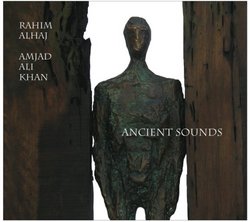| All Artists: Rahim Alhaj, Amjad Ali Khan Title: Ancient Sounds Members Wishing: 1 Total Copies: 0 Label: Thirty Tigers Original Release Date: 1/1/2009 Re-Release Date: 3/31/2009 Genres: Folk, International Music, Pop Styles: Traditional Folk, Middle East Number of Discs: 1 SwapaCD Credits: 1 UPC: 884501083898 |
Search - Rahim Alhaj, Amjad Ali Khan :: Ancient Sounds
 | Rahim Alhaj, Amjad Ali Khan Ancient Sounds Genres: Folk, International Music, Pop
|
Larger Image |
CD Details |
CD ReviewsSoul-warming music from the East Buecherwurm | USA | 06/24/2009 (5 out of 5 stars) "I just heard Rahim Alhaj and Amjad Ali Khan perform live in Denver, featuring their joint album "Ancient Sounds". Exceptionally beautiful combination of two ancient string instruments, the oud (Alhaj) and the sarod (Ali Khan). One Iraqi, one Indian, both true masters of their instrument. This album is described as a musical dialogue of peace for our world. If you like Arabic, classical Persian, or Indian music, you will enjoy this uplifting, inspiring album." OK, it's not ancient ... Fernand Raynaud | California, USA | 09/28/2009 (4 out of 5 stars) "... but considering the sheer amount of malice and ordnance dispensed in the REAL traditional "ancient" dialogue between these two peoples, it's just as well that this IS ersatz. Yes, that "ancient" label is BS, but the whole CD package is beautiful, and it sure has some masterful playing here and there. True, the two instruments are not meant to play together, in fact it's VERY hard to be sure which is which, because they both lose their character in this context, and they play much in the same register; they do get in each other's way. And if only the oud were one of those deep old Egyptians, it might stand out instead of competing, but no, it's a floating bridge oud with a trebly sound. And finally, the instruments sound like they were mic'ed each with a couple of good microphones, creating a pseudo stereo image. But then these two images were overlaid in a bed of reverb, without the simple lateral panning that might easily have separated them, this detail further adding to the growing irritating difficulty of distinguishing and appreciating each player on his own. BUT ... In short it's no small feat to make the album work, and it IS a testimony to good character and good intentions that it works as well as it does. So, indeed, pull out the waterpipe, nay the Bong, and CHILL, there's a good vibe and some generic, but good, have-a-nice day sounds coming up. " Interesting nonetheless. Lost in Siberia | New Siberian Islands | 01/31/2010 (4 out of 5 stars) "Musicians tend to be more eclectic and unbiased than their purist fans. Surely, over the millennia musicians from India and Persia often met, in desert and mountain caravanserais and at the courts of the Great Moguls and Shahs, and did not allow pesky technicalities to get in the way of sessions.
Mr. Bruno, I imagine the real il Nolano in Paris or London listening to John Dowland jamming in an unorthodox manner with musicians from other lands ..." |

 Track Listings (7) - Disc #1
Track Listings (7) - Disc #1